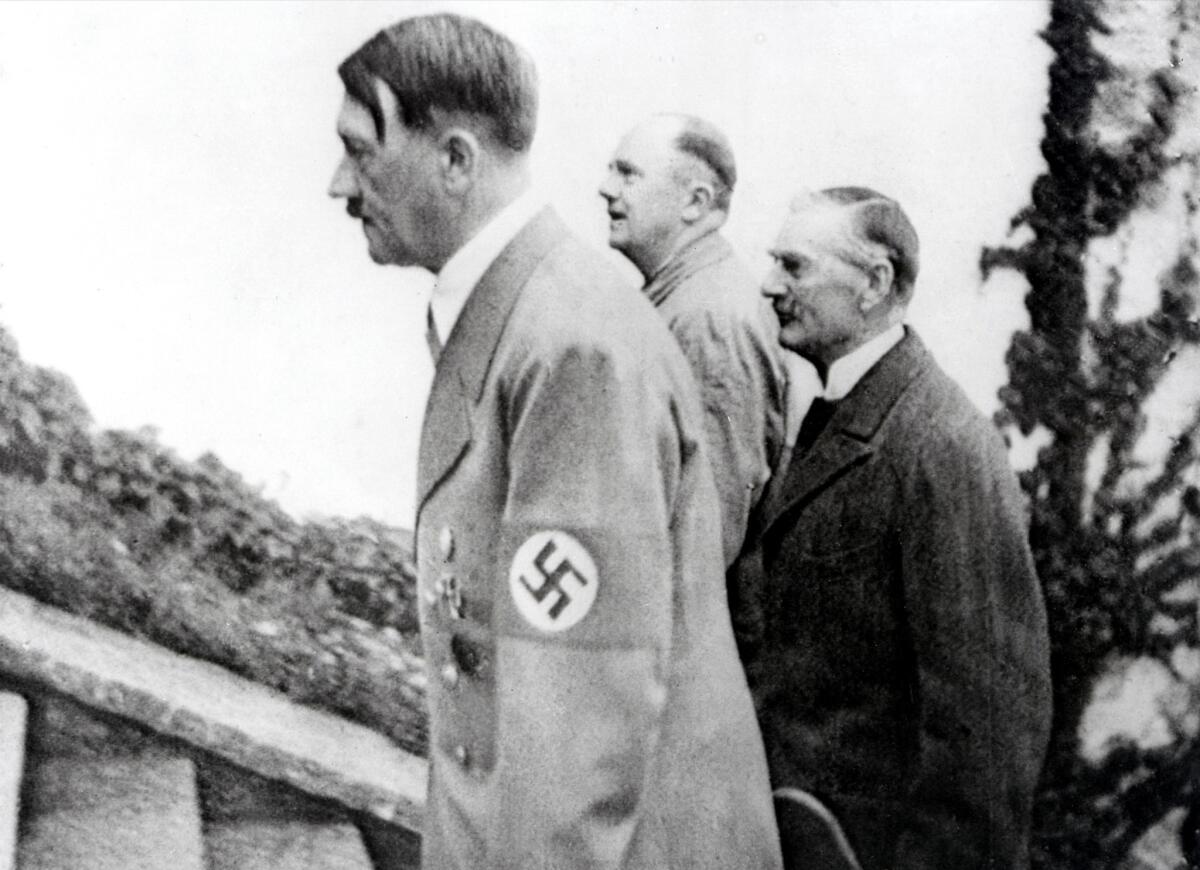Op-Ed: Republicans’ ‘Munich’ fallacy

Adolf Hitler and British Prime minister Neville Chamberlain during one of their meetings in the late 1930s. On September 30, 1938 Chamberlain and a number of other European heads of state signed an agreement which permitted German annexation of the Sudetenland in western Czechoslovakia.
- Share via
You have to feel sorry for Munich. Home to museums, universities, beer halls and one spectacular glockenspiel, it gets international recognition instead for a misbegotten 1938 summit conference in which British Prime Minister Neville Chamberlain “appeased” German Chancellor Adolf Hitler, allowing him to take over Sudetenland, in Czechoslovakia, if he pledged to stop there.
Ever since, “Munich” has become the favored shorthand — especially among American conservatives — for a weak agreement, or any other agreement, with a hostile power. So it was as predictable as the noonday glockenspiel chime that the comparisons to Munich and Chamberlain should have been flying within hours of President Obama’s announcement that a deal had been reached that would prevent, or at least delay, Iran getting the bomb.
“The deal is an American Munich,” cried former U.N. Ambassador John Bolton. “Barack Obama is trying to appease the mullahs in Tehran by making one concession after another.”
Sen. Ted Cruz didn’t even read the agreement, or wait for the announcement, before calling it a “catastrophe on the order and magnitude of Munich.”
A review of American diplomatic history shows that no agreement with a rival, no matter how wise or necessary, can be considered complete until it has endured allusions to Munich and Chamberlain. It may as well be in the Constitution as a step in the treaty ratification process.
“This is almost as bad as the appeasement at Munich,” Gen. Curtis LeMay declared after President Kennedy told the Joint Chiefs he was going to blockade Cuba rather than launch airstrikes. Kennedy, who had written his Harvard thesis about Munich, understood the risks of appeasement. But in a time of dangerous nuclear brinkmanship, he resisted the facile Munich analogy and averted catastrophe.
Kennedy also got the Munich experience in the form of a fashion choice. Black umbrellas, such as the type Chamberlain carried with him on his meeting with Hitler, became the American right’s favorite emoji for kowtowing. Protesters waved black umbrellas at Kennedy, and later at President Nixon as he disembarked from Air Force One in 1972 after his historic gambit to China.
Nixon could not have been surprised to see them. As vice president, he banned his aides from carrying umbrellas for fear that they could be visually linked to Chamberlain. When President Eisenhower returned from a summit with the Soviets in 1955, he gave his remarks in the pouring rain without the courtesy of an umbrella.
Even a president as lionized among conservatives as Ronald Reagan could not escape getting Muniched. Newt Gingrich called the 1985 conference between Reagan and Soviet leader Mikhail Gorbachev “the most dangerous summit for the West since Adolf Hitler met with Neville Chamberlain in 1938 in Munich.” When Reagan announced the INF Treaty — which reduced American and Soviet nuclear firepower — a conservative lobbying group took out a full-page ad in newspapers across the country pairing a picture of Reagan with Chamberlain and Gorbachev with Hitler.
The reality is that Munich was an agreement rooted in Britain’s weakness, and it bears little resemblance to the Iran nuclear deal. In 1938, Britain hadn’t fully rearmed and did not have U.S. backing. Chamberlain had to bow to German military superiority without anything more than assurances in return.
That’s a far cry from recent negotiations with Iran, in which Obama was driving the terms of the agreement with the massive firepower of the U.S. behind him. Economic sanctions had left the Iranians without much leverage. Plus, the deal is as much premised on verification as trust.
And yet, phony Munich analogies refuse to die. The habitual Munichization of conservative foreign policy thinking long ago reached the point of self-parody, but it won’t go away. “Munich” seems to touch a nerve in the limbic regions of the brain, an ancient if unrealistic and dangerous fear that a rival can never by pacified by anything other than immediate, total defeat.
The most courageous acts on the part of statesmen aren’t necessarily those that concede nothing. Like Kennedy rejecting LeMay’s call for airstrikes, courage can be resistance to an irrevocable hard line. The nuclear deal with Iran, like any deal, has its risks. But Obama undoubtedly exercised statesmanship in bringing it to completion. It deserves reasoned consideration, which is nothing like what these Republicans automatically hollering about Munich are offering.
Samuel Kleiner is a fellow with the Yale Law School Information Society Project; Tom Zoellner is an associate professor of English at Chapman University and the author of “Uranium.”
Follow the Opinion section on Twitter @latimesopinion and Facebook
More to Read
A cure for the common opinion
Get thought-provoking perspectives with our weekly newsletter.
You may occasionally receive promotional content from the Los Angeles Times.








